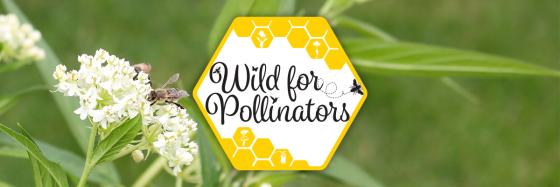Posted March 27, 2017 at 11:27am by Jessica Hyman
Wild for Pollinators - New Initiative Encourages Easy Way to Help Protect Pollinators

Vermont has more than 275 species of bees, three of which have recently been added to the threatened and endangered species list. Across the world, and in our own backyards, many pollinator populations are being threatened by pesticide use, habitat loss, climate change, parasites and disease problems, and more. Wild for Pollinators is a new Vermont initiative raising awareness about the need for pollinator conservation, and encouraging communities to create more pollinator habitat.
“Pollinators are essential for a healthy ecosystem and vibrant food system — both of which are important to Vermonters and our local economy,” said Lily Myers, Wild for Pollinators Coordinator. “Plants depend on pollinators, and we depend on plants.”
It’s estimated that more than three-quarters of the world’s crops benefit from animal pollination, the bees and other creatures whose help we need to be able to produce many of the foods we eat. Sixty to eighty percent of wild plants in Vermont are also dependent on pollinators, according to the Vermont Fish and Wildlife Department.
Wild for Pollinators provides an easy way for Vermonters to be involved in pollinator conservation. It encourages schools, businesses, farms, community gardens, and homeowners to preserve permanent wild spaces for pollinator-friendly habitat, or to create landscapes and/or container gardens with plants and gardening practices that benefit pollinators.The initiative also highlights current pollinator conservation work being done in Vermont.
Sixty four sites have already joined the movement. Schools are using their pollinator gardens as outdoor classrooms, businesses are converting parts of their lawns into habitat, and many homeowners and farmers are planting for pollinators and raising awareness in their communities. Spring is the perfect time to make plans for incorporating pollinator habitat into the landscape, and to get your community involved in the planning and planting process.
It’s easy to get involved and join the initiative. Here are the requirements:
-
Leave an area of your yard, garden, or farm that is at least 5 by 15 feet unmowed and wild OR create container beds or landscaping with plants selected to benefit pollinators.
-
Pledge not to use pesticides, fungicides, or herbicides, all of which can be harmful to pollinators.
Participants will receive an eye-catching Wild for Pollinators sign and native wildflower seeds, generously donated by American Meadows. encourage participants to sign on to the Wild for Pollinators registry, which is connected to the national Million Pollinator Garden Challenge (MPGC), to show how many people are taking action to help the pollinators. (pollinator.org/mpgcmap/).
Wild for Pollinators is a collaboration of KidsGardening.org, the Vermont Community Garden Network, and the Intervale Center, with support from American Meadows and Gardener’s Supply. To learn more and find out how you can BEE involved, visit wildforpollinators.org or register now.
###
The Intervale Center is a nonprofit organization whose mission is to strengthen community food systems. In support of pollinator conservation, the Intervale Center hosts two acres of pollinator sanctuary in partnership with U.S. Fish and Wildlife Service. The IC’s Conservation Nursery plants 20,000+ native trees each year, largely on farms, creating diverse habitat for the insects that are a critical component of our food web. www.intervale.org
KidsGardening.org is a national nonprofit focused on getting kids learning through the garden by supporting school and youth garden programming nationwide. Formerly an initiative of the National Gardening Association, its mission is for every child to have the opportunity to get their hands in the soil and experience all the benefits and joy that youth gardening can bring. KG.org one of the key conservation and gardening nonprofit organizations that helped form the National Pollinator Garden Network. www.kidsgardening.org
The Vermont Community Garden Network is a nonprofit organization that supports and connects hundreds of community and school gardens all over the state. These vibrant food production and community-building sites create habitat for – and benefit from – a wide variety of pollinators. Many of these sites have dedicated pollinator-friendly plantings and/or wild areas. Additionally, VCGN’s Community Teaching Gardens in Burlington include pollinator and beneficial insect plantings. www.vcgn.org
